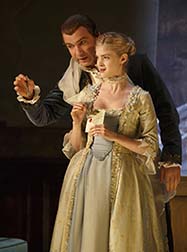
Lucy
Komisar
| Les liaisons Dangereuses
“Les Liaisons Dangereuses.” I seem to be using the word a lot lately: hokey. Chandeliers with lit candles descend to sounds of operatic “ah ah” and pretentious violins. The story is based on a French epistolary novel written in 1782 and meant as a satire. But with the direction by Josie Rourke, you get the feeling that audiences are invited to enjoy the sex stuff. It’s basically about a guy putting notches on his bedpost. (“Sex in the 18th-century French City”?) The anti-hero, the Vicount of Valmont (Lev Schreiber), is conspicuously charming. His former lover, the Marquise of Merteuil, played by a take-no-prisoners Janet McTeer, wants revenge against her former lover Jacour, who has announced that he is going to marry a very rich young girl. And Valmont, because it amuses him, wants to seduce married women known for their high morals. So these are the games the 18th-century aristocrats played.
So, the Marquise makes a deal. (Her favorite word is cruelty. Why jump a low bar?) She will sleep with Valmont again if he succeeds in seducing Jacour’s intended, Cécile, (the very good ingénue Elena Kampouris) who has just left the convent, ie is exceptionally naïve, and been betrothed by her mother. Meanwhile, Valmont is dependent on money from his aunt. So, as always, sex and money. And in exchange, the Marquise will facilitate Valmont’s seduction
of the married Mme de Tourvel (the very fine Birgitte Hjort Sørensen).
He arranges to stay at his aunt’s estate when he knows Tourvel
will be there. He ingratiates himself on walks and by his “goodness,”
giving some cash to a local family in distress, which will be duly
reported to the lady. She ignores warnings about him. And he is a
virtuoso of deceit. He even uses the buttock of a courtesan on which
to write a letter to her.
But it all becomes too cartoonish. A hand hiding behind an arras comes out with wine. Valmont is always with a carafe of red wine and a glass. While he is obviously an ogre, Schreiber is too diffident, flat. OK, romance is deception. I’ll buy that. He is a compleat liar. But he is not believable. The women are weak-minded. I was looking for a romantic albeit seductive leading man. A love ’em and leave ’em Casanova. Valmont wants them to want him, which I suppose is romantic in a way. He doesn’t want to be a rapist, really. The Marquise seems jealous at his success with Tourvel. Does she want him back? She says she wants to sleep with him and then part. Unless there is love involved, pleasure may lead to disgust. But he won’t give up Mme de Tourvel. In fact, he seems smitten. Now it gets interesting. Also a bit complex when the Marquise take the Chevalier Danceny, the beau of Cécile, as a lover. (Do you need a scorecard?) The Marquise tells Valmont, “I still love you.” She accuses
him of loving Tourvel. He replies, “It’s beyond my control.”
He’s come to spend the night, they made an agreement. Her passion
is now anger. And it is war. By the way, he tells Mme de Tourvel,
“I’m so bored, it’s been four months.” Oh,
and there’s a duel between…. Guess.
Analyzing, you get the self-destruction of the seduction and revenge model. Valmont and the Marquise are hoist on the petard of love, which they disparaged. They want pleasure, which they define as sex and seduction. She wants men she controls. He wants women who he seduces to want him. And they refuse to acknowledge their own powerful connection of love and lust. In this case, more love by the Marquise and lust by Valmont. Though she has learned that women are weakened by love, so she will never submit to it. The problem of play is that Lev Schreiber is not seductive or villainous enough. He is flat. He hardly seems interested in the seduction game. And it is hard to believe that Mme de Tourvel is so naïve as to spend weeks meandering in the garden with a fellow she mistrusts and then so readily fall for him. As Schreiber portrays him, he is just not that charming. Think of the novel written in 1782, when the satire was more biting. The characters need to be a lot more subtle to make it work on that level today.
|
| museums | NYTW mail | recordings | coupons | publications | classified |



